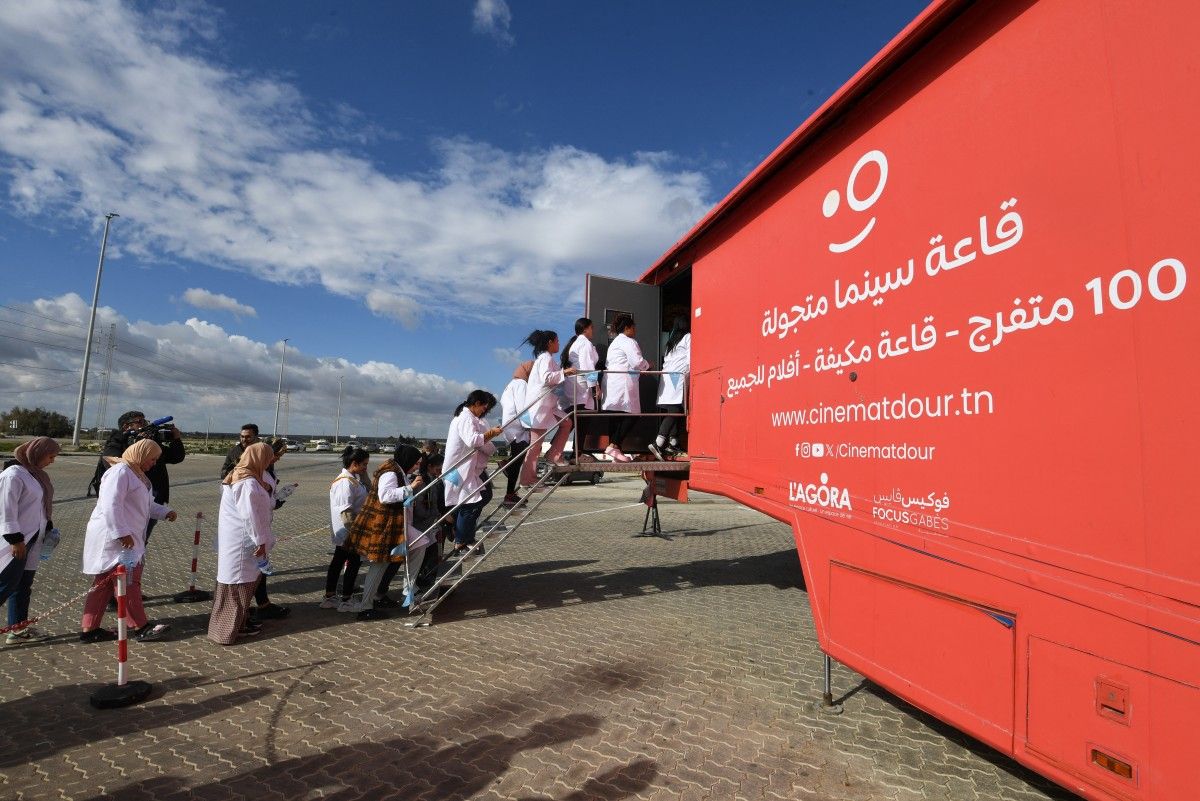
CinemaTdour turns a truck into a mobile cinema, bringing movies and social inclusion to underserved areas in Tunisia and beyond.
"If you can't go to the cinema, it will come to you" might well describe CinemaTdour, a mobile cinema truck touring Tunisia to make the seventh art accessible to everyone, from rural areas to underserved neighborhoods.
Dozens of workers joyfully step down from a large red truck parked in front of their factory in Djemmal, a central-eastern town far from urban hubs.
Amine Elhani, a 23-year-old mechatronics intern, "has never had the chance to go to the cinema" but just watched the comedy Bolice (Police) inside the 38-ton truck, transformed into a real movie theater with soundproofing, air conditioning, and 100 comfortable red seats.
"The screen is bigger. The sound effects are amazing. It’s also a wonderful experience because we’re with friends," he told AFP, adding that he usually watches movies on his phone.
Tunisia has only 15 cinemas, mostly located in the capital, with a few others in Bizerte (north), Sousse (center), and Djerba (south).
This lack of access is what inspired CinemaTdour ("the cinema that travels"), launched in May by the private Agora cultural network and the Focus Gabès association, with support from discreet sponsors. "We wanted to find a way to reach a large audience quickly, with limited resources, and give them this cinematic experience," explains Ghofrane Heraghi, the project director, to AFP.
While other mobile cinemas have appeared in Guinea, Iraq, and Syria in recent years, offering a theater inside a truck is "a unique initiative in Africa and the Middle East," she asserts.
In Djemmal, CinemaTdour offered 10 days of free screenings "for Dräxlmaier employees, their families and friends, the city, and the Monastir region," announced Jihene Ben Amor, communications manager for the German car parts supplier, which aims to "contribute to the development of the four regions" where it operates.
For workers earning between 600 and 1,000 dinars (€180 to €300) a month, paying for tickets (10 to 20 dinars each) for the whole family and transport to Sousse, an hour away, is simply impossible.
This original partnership with companies has become, according to Ms. Heraghi, a cornerstone of CinemaTdour's business model, as the project receives no public funding. The truck was purchased on credit for one million dinars (€300,000), with annual operating costs (film rights, maintenance, staff, etc.) of 500,000 dinars.
A few days later, CinemaTdour arrived in Hay Hlel, a district of 10,000 inhabitants near central Tunis but marked by poverty, unemployment, and delinquency.
Crowds of children jostled behind barriers. Eleven-year-old Yomna Warhani’s eyes sparkled with excitement: "This is my first time going to the cinema. I can’t wait to see what’s inside and what movies they’re showing."
Nejiba El Hadji, a 47-year-old homemaker, cannot afford to take her four children to the cinema and has never been herself: "It’s not just the kids who will be happy, believe me."
In Hay Hlel, "there’s nothing, no cultural center, no activities, just the street. People say our children are lost," she laments.
In just a few months, CinemaTdour "has reached over 15,000 people," explains Ghofrane Heraghi, including 7,500 in the Nefta oasis (south), where screenings were offered for free for a month, funded by a date exporter.
In Hay Hlel, the World Health Organization financed 15 days of screenings, alternating between popular movies and discussions focused on mental health, smoking, drugs, and violence against women.
"What drives us is the social impact of culture: changing mentalities and sharing values, social cohesion, and togetherness," emphasizes Ms. Heraghi.
This "maximum inclusion" also involves, she notes, recruiting local teams to "organize the crowd, prepare the truck, and manage the screenings," with the aim of empowering residents and inspiring vocations.
Looking ahead, CinemaTdour is seeking funding to "buy six or seven more trucks and establish regular events" in each region. And why not, dreams Ghofrane Heraghi, "go to Algeria, Libya, or even tour Africa."
With AFP
Comments